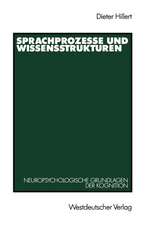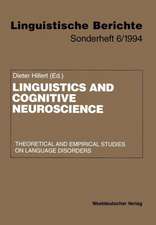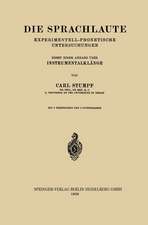The Nature of Language: Evolution, Paradigms and Circuits
Autor Dieter Hillerten Limba Engleză Hardback – 30 apr 2014
| Toate formatele și edițiile | Preț | Express |
|---|---|---|
| Paperback (1) | 383.71 lei 6-8 săpt. | |
| Springer – 3 sep 2016 | 383.71 lei 6-8 săpt. | |
| Hardback (1) | 391.02 lei 6-8 săpt. | |
| Springer – 30 apr 2014 | 391.02 lei 6-8 săpt. |
Preț: 391.02 lei
Nou
Puncte Express: 587
Preț estimativ în valută:
74.82€ • 80.01$ • 62.38£
74.82€ • 80.01$ • 62.38£
Carte tipărită la comandă
Livrare economică 17 aprilie-01 mai
Preluare comenzi: 021 569.72.76
Specificații
ISBN-13: 9781493906086
ISBN-10: 1493906089
Pagini: 280
Ilustrații: XV, 201 p. 89 illus., 55 illus. in color.
Dimensiuni: 155 x 235 x 20 mm
Greutate: 0.49 kg
Ediția:2014
Editura: Springer
Colecția Springer
Locul publicării:New York, NY, United States
ISBN-10: 1493906089
Pagini: 280
Ilustrații: XV, 201 p. 89 illus., 55 illus. in color.
Dimensiuni: 155 x 235 x 20 mm
Greutate: 0.49 kg
Ediția:2014
Editura: Springer
Colecția Springer
Locul publicării:New York, NY, United States
Public țintă
ResearchCuprins
Preface.- Introduction.- PART I. Evolution. - Chapter 1: The Human Lineage.- 1.1 An Overview.- 1.2 Fossil Evidence.- Chapter 2. Protomusic and Speech.- 2.1 The Role of Protomusic.- 2.2 Evolutionary Milestones.- Chapter 3. Genetic Foundations.- 3.1 Language-Related Genes.- 3.2 The Role of the Basal Ganglia.- Chapter 4. The Rise of Cognition.- 4.1 Comparative Studies.- 4.2 Proto-Cognition.- PART II. Paradigms.- Chapter 5. The Human Language System.- 5.1 Biological Disposition.- 5.2 Linguistic Wiring.- Chapter 6. Semantics and Syntax.- 6.1 Sentence Structures.- 6.2 Neural Nets.- Chapter 7. Lexical Concepts.- 7.1 Constructions.- 7.2 Mental Space.- Chapter 8. Figurative Language.- 8.1. Lexical Dark Matters.- 8.2 Idioms and Metaphors.- PART III. Circuits.-Chapter 9. Generating Sentences.- 9.1 Structural Complexity.- 9.2 The Role of Working Memory.- Chapter 10. Accessing Word Meanings.- 10.1 Lexical Concepts.- 10.2 Figures of Speech.- Chapter 11. Atypical Language.- 11.1 Aphasia.- 11.2 Communicative Disorders.- Chapter 12. Language Acquisition.- 12.1 The Genetic Program.- 12.2 The Multilingual Brain.-Prospects.- Index.
Notă biografică
Dieter Hillert, born in Germany, is a cognitive scientist and best known for studying language through cognitive, neurobiological and comparative approaches. He holds positions as an Adjunct Professor and Research Scientist, and is affiliated with San Diego State University, University of California, San Diego, and University of Utah. He also works as a science writer on topics related to mind and brain.
Textul de pe ultima copertă
The book The Nature of Language addresses one of the most fundamental questions of mankind: how did language evolve, and what are the neurobiological and cognitive foundations of language processing? This monograph explores these questions from different perspectives to discuss the building blocks of language evolution and how they developed in the way they can be found in modern humans. Furthermore, primarily neural mapping methods of cognition presented in this research provide extremely valuable data about the neural circuitries that are involved in language processing. Thus, the book explores and illustrates cortical mapping in typical language patterns, but also cortical mapping in atypical populations that fail to process particular language aspects. In sum, an evolutionary stance is used to explore how language abilities of the Homo sapiens evolved to communicate for the purposes of conveying information, ideas, emotions, goals, humor, etc. This book presents an evolutionary language model that builds on the cognitive abilities of our evolutionary ancestors, and it allows readers to draw a variety of expansive conclusions from that, including the idea that human language as an interface system provides the basis for consciousness.
Caracteristici
Addresses all scholars interested in evolution, biology, neurology, language, cognition and theory of mind Uses modern neuroimaging technology to map language and related cognitive functions Illustrates and discusses a genetic blueprint for language Includes supplementary material: sn.pub/extras






















